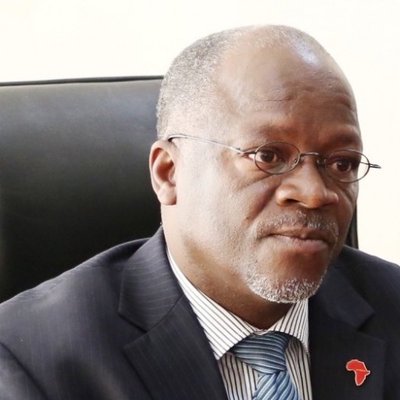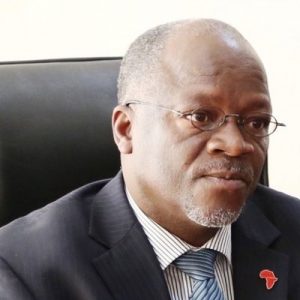
17 March 2021. The Wall Street Journal: John Magufuli, Tanzania’s firebrand president who dismissed the severity of the coronavirus pandemic and urged voters to gather in churches and mosques to protect themselves against it, has died, leaving behind a mixed legacy and questions over the leadership of his gold-producing nation. He was 61 years old.
Tanzania’s Vice President Samia Suluhu Hassan reported Mr. Magufuli’s death on state television shortly before midnight on Wednesday, saying he had died of heart complications while being treated in Dar es Salaam’s Mzena hospital.
“Tanzania has lost a courageous leader,” the vice president said through tears, standing next to the national flag.
Speculation had been rife across East Africa for more than a week that Mr. Magufuli, a vocal Covid-19 skeptic, was critically ill with the coronavirus.
Nicknamed “the Bulldozer” for the forceful leadership style he used on allies and opponents alike, Mr. Magufuli was among East Africa’s rising cadre of autocratic technocrats, who saw Western-style democracy as an obstacle to the economic transformation of the world’s poorest continent.
His populist policies included public spats with international mining companies he accused of shortchanging Tanzanians. He also chastised his own officials for wasteful spending. These actions and rhetoric secured Mr. Magufuli huge support in conservative and rural communities.
Last year, the World Bank classified Tanzania as a middle-income economy for the first time, a feat achieved five years ahead of schedule. Tanzania’s increasing wealth was driven by domestic and foreign investments in infrastructure and agriculture, particularly from China, the country’s largest trading partner.
Those successes, however, came at the cost of civil and personal liberties in what had long been considered one of Africa’s more stable democracies. Once the Covid-19 pandemic arrived in Africa, Mr. Magufuli never put his country into lockdown and mocked masks and other social-distancing measures, a decision that his critics say led to thousands of unnecessary deaths. News organizations that reported on the virus, which Mr. Magufuli insisted had been defeated in Tanzania in May, were fined and journalists threatened with prosecution.
Instead, he encouraged citizens to pray in churches and mosques to defeat a “satanic” virus and refused free Covid-19 vaccines from a World Health Organization-backed facility that provides shots to poor countries—even as reports mounted of prominent figures succumbing to respiratory illnesses. Late last month, Mr. Magufuli’s breathless and coughing finance minister, flanked by unmasked doctors, gave a news conference to deny rumors of his death.
Days earlier—following the death of the vice president of the semiautonomous island of Zanzibar from Covid-19—Mr. Magufuli for the first time in months asked Tanzanians to take precautions against the coronavirus, including by wearing locally made masks. “This illness kills,” he told worshipers after attending a church service in the capital, Dodoma.
Under the Tanzanian constitution, Ms. Suluhu, the current vice president and Mr. Magufuli’s running mate in last year’s election, becomes president-elect and will complete his five-year mandate.
Opposition leaders on Wednesday offered their condolences. “I have just spoken over the phone with President-elect Suluhu Samia and offer condolences following the death of President Magufuli,” said Zitto Kabwe, leader of the Alliance for Change and Transparency Party.
Mr. Magufuli swept last year’s election, with the U.S. embassy raising doubts over a margin of victory that saw the president win 84% of the vote, while his ruling party secured 253 out of the 264 seats in parliament. Mr. Magufuli spent years concentrating power around his own personal authority, raising fears of a turbulent political transition.
Born on Oct. 29, 1959, in northern Tanzania in a fishing village near the shores of Lake Victoria, John Pombe Magufuli worked as a high-school mathematics and chemistry teacher before training as an industrial chemist.
He was elected a lawmaker for the ruling Chama Cha Mapinduzi party in 1995 and served a decade as works and infrastructure minister, forging a reputation as an incorruptible enforcer of government policies, including the construction of multibillion-dollar road and railway projects.
Just days after coming to power in late 2015, Mr. Magufuli canceled a lavish Independence Day ceremony and directed that the funds be used to widen a highway notorious for traffic jams in Tanzania’s commercial capital of Dar es Salaam.
Weeks later, he banned foreign travel for all civil servants, a move that saved his government some $430 million during its first year, according to the central bank. He outlawed political rallies, arguing that voters should be left alone during nonelection years to focus on building the nation.
Mr. Magufuli argued those heavy-handed moves were necessary to change the economic status quo, in which the gulf between politically connected elites and poor farmers and blue-collar workers was widening. Soon, his attention turned to the mining industry, the mainstay of the Tanzanian economy.
In 2017, Mr. Magufuli called executives of the world’s largest gold miner— Barrick Gold Corp. —thieves during a high-profile tax spat that resulted in the Canadian company paying a $300 million settlement to save its license. That year he also ordered Acacia Mining to pay a large tax bill, accusing the miner of under-declaring the value of its mineral exports for nearly two decades. Weeks later, officials confiscated diamonds worth $30 million belonging to U.K.-based Petra Diamonds.
Mr. Magufuli passed legislation stipulating that the government take a 16% stake in all mining projects. He threatened to expel mining investors he accused of stealing resources. In 2019, Tanzania displaced Venezuela as the world’s least attractive mining jurisdiction, according to Canada-based Fraser Institute, as Mr. Magufuli continued a campaign against miners.
Mr. Magufuli’s combative posture against foreign companies was soon applied against domestic political opposition. His government implemented laws stifling independent journalism and severely restricting the operations of activist groups and political parties, drawing condemnation of rights groups.
A Tanzanian opposition leader, Tundu Lissu, was shot 16 times in an assassination attempt in 2017, but survived. After almost a year of treatment in Belgium, he returned to run against Mr. Magufuli last year. But Mr. Lissu fled abroad again shortly after the violent election, citing threats to his life.
Mr. Magufuli is survived by his wife, Janeth, and five children.


